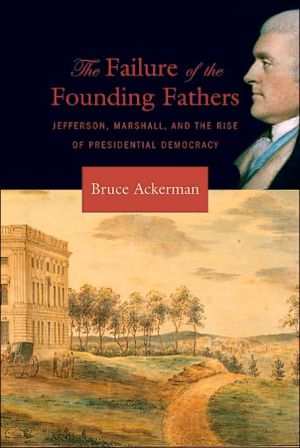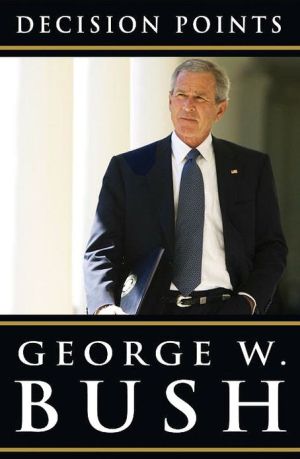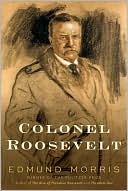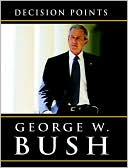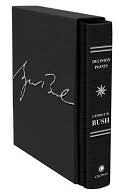The Failure of the Founding Fathers: Jefferson, Marshall, and the Rise of Presidential Democracy
The ink was barely dry on the Constitution when it was almost destroyed by the rise of political parties in the United States. As Bruce Ackerman shows, the Framers had not anticipated the two-party system, and when Republicans battled Federalists for the presidency in 1800, the rules laid down by the Constitution exacerbated the crisis. With Republican militias preparing to march on Washington, the House of Representatives deadlocked between Thomas Jefferson and Aaron Burr. Based on seven...
Search in google:
The ink was barely dry on the Constitution when it was almost destroyed by the rise of political parties in the United States. As Bruce Ackerman shows, the Framers had not anticipated the two-party system, and when Republicans battled Federalists for the presidency in 1800, the rules laid down by the Constitution exacerbated the crisis. With Republican militias preparing to march on Washington, the House of Representatives deadlocked between Thomas Jefferson and Aaron Burr. Based on seven years of archival research, the book describes previously unknown aspects of the electoral college crisis. Ackerman shows how Thomas Jefferson counted his Federalist rivals out of the House runoff, and how the Federalists threatened to place John Marshall in the presidential chair. Nevertheless, the Constitution managed to survive through acts of statesmanship and luck.Despite the intentions of the Framers, the presidency had become a plebiscitarian office. Thomas Jefferson gained office as the People's choice and acted vigorously to fulfill his popular mandate. This transformation of the presidency serves as the basis for a new look at Marbury v. Madison, the case that first asserted the Supreme Court's power of judicial review. Ackerman shows that Marbury is best seen in combination with another case, Stuart v. Laird, as part of a retreat by the Court in the face of the plebiscitarian presidency. This "switch in time" proved crucial to the Court's survival, allowing it to integrate Federalist and Republican themes into the living Constitution of the early republic. Ackerman presents a revised understanding of the early days of two great institutions that continue to have a major impact on American history: the plebiscitarian presidency and a Supreme Court that struggles to put the presidency's claims of a popular mandate into constitutional perspective. Publishers Weekly Focusing on the electoral crisis of 1801, Yale constitutional scholar Ackerman advances a bold new interpretation of early American history. The election is noted for the electoral tie between two Republicans, Thomas Jefferson and Aaron Burr. Jefferson won, of course, but Ackerman's focus is less on the tie than on the sound Republican thrashing of Federalist John Adams. The fracas, he says, revealed a serious flaw in the framework for presidential elections: it couldn't easily accommodate party politics, which the framers had abhorred. The tempestuous jockeying of 1801, the author says, "marks the birth-agony of the plebiscitarian presidency"-that is, having soundly defeated the Federalists, a president claimed for the first time that the people had given him a mandate for broad change. In sketching the consequences of Jefferson's ascendance, Ackerman also rereads the history of the Supreme Court, suggesting that scholars have erred in abstracting the famed Marbury v. Madison decision from the larger political context, i.e., Federalist Chief Justice John Marshall used judicial review to try to limit Jefferson's mandate. Ackerman innovatively recasts the histories of parties, constitutional interpretation and presidential politics. This is not an easy read-indeed, it's quite dense at times, and the argument is complex-but the payoff is worth it. Rarely has a study of American history been more timely. (Oct.) Copyright 2005 Reed Business Information.
Pt. 1The people's presidentIntroduction : American on the brink31The original misunderstanding162John Marshall for president363Jefferson counts himself in554On the brink775What went right?93Pt. 2The people and the CourtIntroduction : constitutional brinksmanship1116Federalist counterattack1167Republican triumph1428Marbury v. Stuart1639Presidential purge19910Synthesis22411Reverberations245Horatius's presidential knot269Judge Bassett's protest276
\ American Journal of Legal HistoryAckerman has a wonderful ability to draw new insights from conventional understandings of political events by focusing on small, concrete incidents.\ — Barbara Oberg\ \ \ \ \ \ Boston GlobeBruce Ackerman, who teaches at Yale Law School, might be expected to advocate for either the Jeffersonians or their opponents, the Federalists. Instead he dishes blame all around to make the point that the mistakes of 1787 have shaped our politics. He sees American constitutionalism as a work in progress over two centuries. This liberal jurisprudence opposes the originalism of Antonin Scalia and other conservative jurists who insist that the true meanings of a law or decision are simply the literal ones right there in the text if you read them the right (Right?) way. The historical approach favored by Ackerman stresses continual reinterpretation of constitutional articles, legislation, presidential orders, and judicial decisions. Like the landmark Brown v. Board of Education decision that still inspires its practitioners, it needs a lot of detailed history to back up the argument. And that's what we get in The Failure of the Founding Fathers. Fortunately, Ackerman can tell a story as well as score points against originalists...[This is] thought-provoking history.\ — David Waldstreicher\ \ \ \ The Law and Politics Book ReviewThe Failure of the Founding Fathers contains the familiar dynamics of institutional triggers, synthesis of orders, and the nonlegal processes that play an important role in the American constitutional order, but it also offers new surprises, promising to change the way readers think about the date of the founding, MARBURY v. MADISON, and John Marshall...One cannot take leave of this book without noting what a fun read it is, with Ackerman acting as the armchair narrator leading the reader through events. Filled with questions of "who dunnit?" with the machinations of "crafty" and "sensible" politicians, as well as the author's own "detective" work, this book never lets the reader forget the thrills to be found in constitutional history.\ — Kathleen S. Sullivan\ \ \ \ \ \ Times Higher Education SupplementHighly ambitious and well-researched...[Its] great value [is its] testimony to the essential fragility of constitutional and democratic development...Ackerman tells his story well and persuasively...The book is a tour de force that draws on an impressive amount of archival research. Yet its real value lies less within Ackerman's absorbing story of this dire political crisis and the political dynamics it precipitated than in his skill and imagination in advancing his theory of constitutional change in the U.S. His arguments are solid and remain refreshingly heretical in a milieu that typically lionises the framers without accepting their limitations and the need for subsequent institutional and constitutional adjustments to accommodate changing political realities.\ — John Owens\ \ \ \ \ \ Publishers WeeklyFocusing on the electoral crisis of 1801, Yale constitutional scholar Ackerman advances a bold new interpretation of early American history. The election is noted for the electoral tie between two Republicans, Thomas Jefferson and Aaron Burr. Jefferson won, of course, but Ackerman's focus is less on the tie than on the sound Republican thrashing of Federalist John Adams. The fracas, he says, revealed a serious flaw in the framework for presidential elections: it couldn't easily accommodate party politics, which the framers had abhorred. The tempestuous jockeying of 1801, the author says, "marks the birth-agony of the plebiscitarian presidency"-that is, having soundly defeated the Federalists, a president claimed for the first time that the people had given him a mandate for broad change. In sketching the consequences of Jefferson's ascendance, Ackerman also rereads the history of the Supreme Court, suggesting that scholars have erred in abstracting the famed Marbury v. Madison decision from the larger political context, i.e., Federalist Chief Justice John Marshall used judicial review to try to limit Jefferson's mandate. Ackerman innovatively recasts the histories of parties, constitutional interpretation and presidential politics. This is not an easy read-indeed, it's quite dense at times, and the argument is complex-but the payoff is worth it. Rarely has a study of American history been more timely. (Oct.) Copyright 2005 Reed Business Information.\ \ \ \ \ Library Journal"Constitutional muckraking isn't much the fashion in these hagiographic times," writes Ackerman (law & political science, Yale; Social Justice in the Liberal State). He goes against the fashion to produce this major reinterpretation of the immediate post-1787 history of America's charter. Ackerman writes that the Constitution was, in parts, a "breathtaking show of incompetent draftsmanship" by the Founding Fathers, whose blunders might have wrecked the new republic if not for several acts of statesmanship and a good deal of luck. Thomas Jefferson's victory in the presidential election of 1800 emerges as a Constitutional event equal in importance to the Constitutional Convention itself, as power shifted from Federalists to Republicans. John Marshall's accommodations to the birth of the "plebiscitarian presidency" were as significant as anything achieved by the Supreme Court through Marbury v. Madison's establishment of judicial review in 1803. An eminent Constitutional scholar and a fine writer, Ackerman has produced a book essential for most libraries, although smaller public libraries might be satisfied with the straightforward narrative of James F. Simon's What Kind of Nation.-Robert F. Nardini, Chichester, NH Copyright 2005 Reed Business Information.\ \
